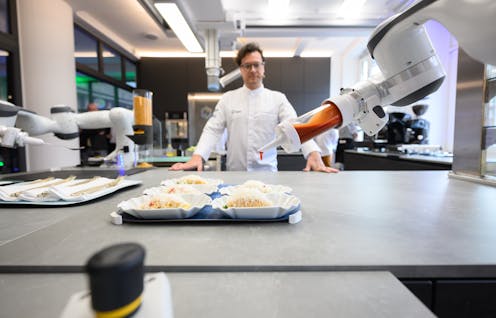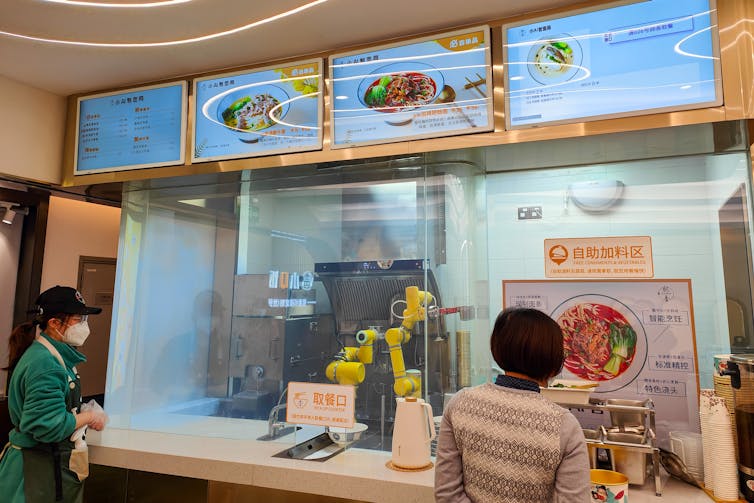
Automating food is unlike automating anything else. Food is fundamental to life – nourishing body and soul – so how it’s accessed, prepared and consumed can change societies fundamentally.
Automated kitchens aren’t sci-fi visions from “The Jetsons” or “Star Trek.” The technology is real and global. Right now, robots are used to flip burgers, fry chicken, create pizzas, make sushi, prepare salads, serve ramen, bake bread, mix cocktails and much more. AI can invent recipes based on the molecular compatibility of ingredients or whatever a kitchen has in stock. More advanced concepts are in the works to automate the entire kitchen for fine dining.
Since technology tends to be expensive at first, the early adopters of AI kitchen technologies are restaurants and other businesses. Over time, prices are likely to fall enough for the home market, possibly changing both home and societal dynamics.
Can food technology really change society? Yes, just consider the seismic impact of the microwave oven. With that technology, it was suddenly possible to make a quick meal for just one person, which can be a benefit but also a social disruptor.
Familiar concerns about the technology include worse nutrition and health from prepackaged meals and microwave-heated plastic containers. Less obviously, that convenience can also transform eating from a communal, cultural and creative event into a utilitarian act of survival – altering relationships, traditions, how people work, the art of cooking and other facets of life for millions of people.
For instance, think about how different life might be without the microwave. Instead of working at your desk over a reheated lunch, you might have to venture out and talk to people, as well as enjoy a break from work. There’s something to be said for living more slowly in a society that’s increasingly frenetic and socially isolated.
Convenience can come at a great cost, so it’s vital to look ahead at the possible ethical and social disruptions that emerging technologies might bring, especially for a deeply human and cultural domain – food – that’s interwoven throughout daily life.
With funding from the U.S. National Science Foundation, my team at California Polytechnic State University is halfway into what we believe is the first study of the effects AI kitchens and robot cooks could have on diverse societies and cultures worldwide. We’ve mapped out three broad areas of benefits and risks to examine.
Creators and consumers
The benefits of AI kitchens include enabling chefs to be more creative, as well as eliminating repetitive, tedious tasks such as peeling potatoes or standing at a workstation for hours. The technology can free up time. Not having to cook means being able to spend more time with family or focus on more urgent tasks. For personalized eating, AI can cater to countless special diets, allergies and tastes on demand.
However, there are also risks to human well-being. Cooking can be therapeutic and provides opportunities for many things: gratitude, learning, creativity, communication, adventure, self-expression, growth, independence, confidence and more, all of which may be lost if no one needs to cook. Family relationships could be affected if parents and children are no longer working alongside each other in the kitchen – a safe space to chat, in contrast to what can feel like an interrogation at the dining table.
The kitchen is also the science lab of the home, so science education could suffer. The alchemy of cooking involves teaching children and other learners about microbiology, physics, chemistry, materials science, math, cooking techniques and tools, food ingredients and their sourcing, human health and problem-solving. Not having to cook can erode these skills and knowledge.
Community and cultures
AI can help with experimentation and creativity, such as creating elaborate food presentations and novel recipes within the spirit of a culture. Just as AI and robotics help generate new scientific knowledge, they can increase understanding of, say, the properties of food ingredients, their interactions and cooking techniques, including new methods.
But there are risks to culture. For example, AI could bastardize traditional recipes and methods, since AI is prone to stereotyping, for example flattening or oversimplifying cultural details and distinctions. This selection bias could lead to reduced diversity in the kinds of cuisine produced by AI and robot cooks. Technology developers could become gatekeepers for food innovation, if the limits of their machines lead to homogeneity in cuisines and creativity, similar to the weirdly similar feel of AI art images across different apps.
Also, think about your favorite restaurants and favorite dinners. How might the character of those neighborhoods change with automated kitchens? Would it degrade your own gustatory experience if you knew those cooking for you weren’t your friends and family but instead were robots?

The hope with technology is that more jobs will be created than jobs lost. Even if there’s a net gain in jobs, the numbers hide the impact on real human lives. Many in the food service industry – one of the most popular occupations in any economy – could find themselves unable to learn new skills for a different job. Not everyone can be an AI developer or robot technician, and it’s far from clear that supervising a robot is a better job than cooking.
Philosophically, it’s still an open question whether AI is capable of genuine creativity, particularly if that implies inspiration and intuition. Assuming so may be the same mistake as thinking that a chatbot understands what it’s saying, instead of merely generating words that statistically follow the previous words. This has implications for aesthetics and authenticity in AI food, similar to ongoing debates about AI art and music.
Safety and responsibility
Because humans are a key disease vector, robot cooks can improve food safety. Precision trimming and other automation can reduce food waste, along with AI recipes that can make the fullest use of ingredients. Customized meals can be a benefit for nutrition and health, for example, in helping people avoid allergens and excess salt and sugar.
The technology is still emerging, so it’s unclear whether those benefits will be realized. Foodborne illnesses are an unknown. Will AI and robots be able to smell, taste or otherwise sense the freshness of an ingredient or the lack thereof and perform other safety checks?
Physical safety is another issue. It’s important to ensure that a robot chef doesn’t accidentally cut, burn or crush someone because of a computer vision failure or other error. AI chatbots have been advising people to eat rocks, glue, gasoline and poisonous mushrooms, so it’s not a stretch to think that AI recipes could be flawed, too. Where legal regimes are still struggling to sort out liability for autonomous vehicles, it may similarly be tricky to figure out liability for robot cooks, including if hacked.
Given the primacy of food, food technologies help shape society. The kitchen has a special place in homes, neighborhoods and cultures, so disrupting that venerable institution requires careful thinking to optimize benefits and reduce risks.
Patrick Lin receives funding from the US National Science Foundation for this work.
This article was originally published on The Conversation. Read the original article.







